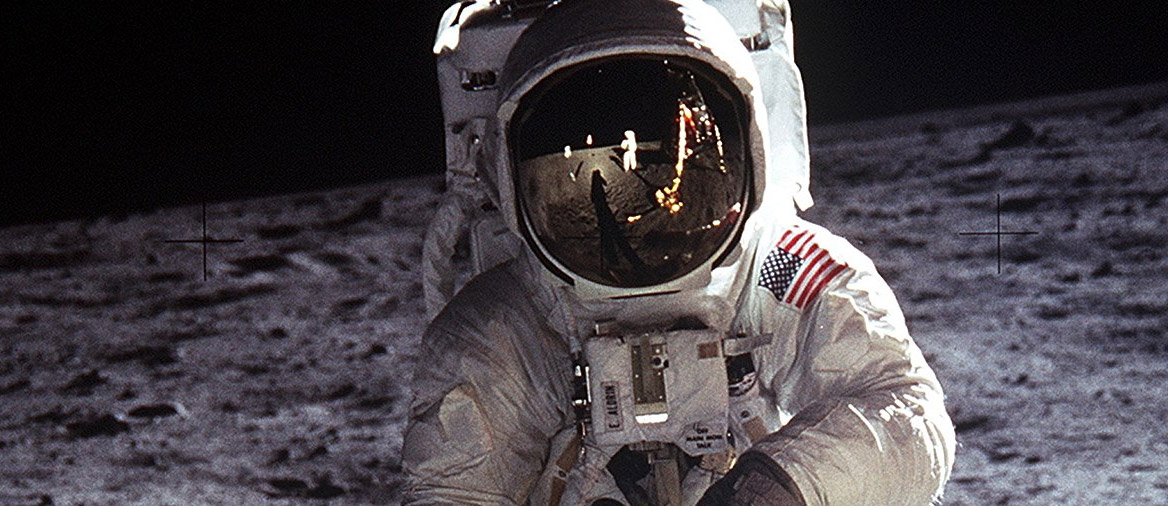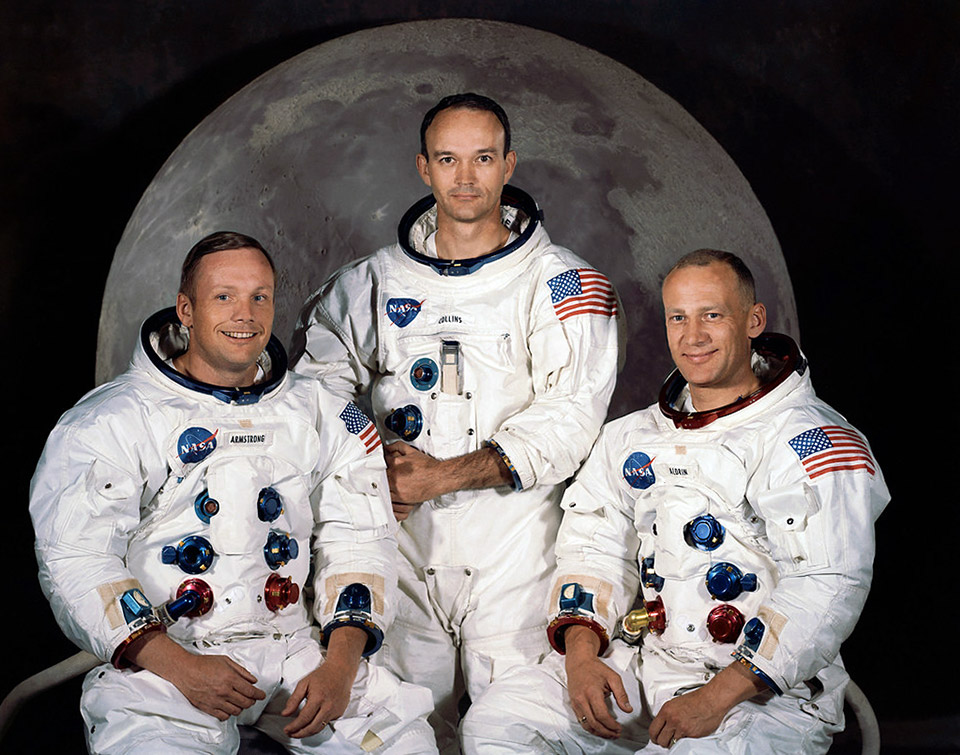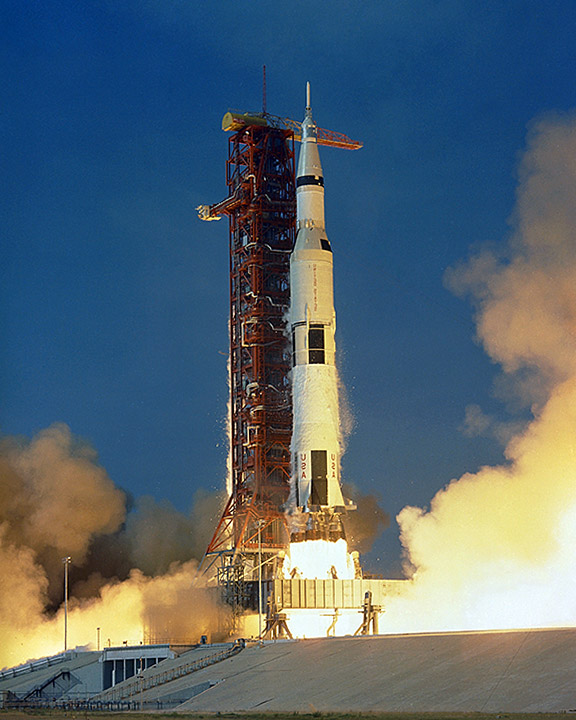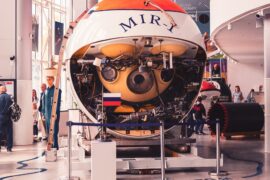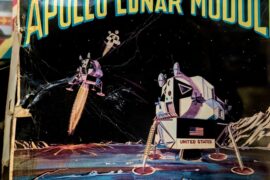The Apollo 11 mission was a historic moment like no other. More than 53 million American households and over 650 million sat expectantly on July 20, 1969 at 3:17 PM ET to watch the Lunar module Eagle land on the Moon. It was an event that marked a whole decade and the beginning of the age of space exploration for humans.
But why was Apollo 11 important?
In this article, we’ll take a look at some of the reasons why this NASA mission is, even to this day, such an important moment, not just for the history of the United States, but for all humankind.
1. It was the first time a person walked on the moon
The whole Apollo program was an incredible achievement in science and engineering. Just think about how amazing it was for someone at the time. Only 12 years before, in 1957, the idea of humans going to space seemed like something taken out of science-fiction books. No vehicle had even managed to achieve orbital spaceflight. And then, barely a decade later, a man was for the first time setting foot on the Moon.
No one knew what was going to happen. What would they find? would the astronauts be safe? Would they be able to return safely? The technology had barely been tested and was developed in record times. There were a lot of unknowns. There was even a popular theory at the time that the Lunar module was going to sink into the Moon because a scientist at the time believed the surface was made out of sand-like material.
It was on July 20, 1969, at 3:17 pm EST (20:17 UTC) that Neil Armstrong became the first person to walk on the Moon. A few minutes later, Edwin “Buzz” Aldrin joined him. The pilot Michael Collins stayed on the ship.
Not only was the Moon landing by the Apollo 11 the first time someone walked on the Moon. It was the first time anyone walked anywhere outside our planet.
2. It brought together the whole country (and most of the world)
The Apollo 11 mission was not just a NASA or a US government operation. The whole country got together and participated in some way or another.
From the moment that John F. Kennedy announced to the world the Apollo program in front of a crowd of 40,000 people in 1962, the whole nation committed itself to achieve the goal of sending a man to the Moon and returning him safely.
The original idea was to make the Apollo program a collaborative mission with The Soviet Union and other agencies but that plan was scratched quickly as the soviets declined the offer because they wanted to focus on their own program which at the time was more developed.
A lot of resources, both economic and material had to be put into building the Apollo program which culminated with the Apollo 11 mission. It is estimated that more than $25.8 billion were invested into the program which would be approximately $270 billion dollars today adjusting for inflation.
It is also estimated that more than 400,000 scientists and engineers participated in some form or another to develop the technology and figure out the science to do it. At this time, the US didn’t even have a rocket that could go into Earth’s orbit, much less one that could go to the Moon and back.
3. Lots of new technologies were invented as a result
Do you have a pair of wireless headphones? how about a dustbuster? have you ever eaten freeze-dried foods? Do you know someone that has to use insulin pumps? We can thank the Apollo program for all of these and many more inventions.
Going to outer space is not only about building a rocket that can do it. Everything works differently in space where there’s no gravity. Everyday objects like toilets, shoes, and even food had to be rethought from scratch to work in low or zero gravity. But it was thanks to this that many new discoveries were made and new technologies were developed. As time passed, people figured out ways to improve life on Earth with them and today there’s a long list of items that we take for granted that started as part of the Apollo program. Here’s a list of some of them:
- Wireless headphones
- Wireless dustbusters
- Shock absorbers used on modern bridges
- Fireproof materials used by firefighters
- Vacuum-sealed food
- Freeze-dried food
- Insulin pumps
- Shock-absorbing shoes
- Thermal blankets
- Retractable roofs in stadiums
- Vibration-sensing detectors
- Programmable pacemakers
- Better solar panels
- Cooling technology used by NASCAR drivers, armored vehicles, firefighters, and others
- Programmable medication systems
To learn more about the technologies invented thanks not only to Apollo 11 but to space exploration in general, check out our articles about 10 inventions that came from NASA and 10 benefits of space exploration.
4. It started the age of space exploration
If humans want to survive long-term as a species, we will have to become a space-faring civilization. There’s no discussion about that. Sooner or later, Earth will become uninhabitable to humans. It could happen because of a meteorite impact, climate change, or because the Sun will swell up and consume it in a few billion years.
We need to get to learn to live in space and colonize other planets. The problem is, that is going to take a long time. So it’s better to do it sooner rather than later.
The moon landing, just like Neil Armstrong said in his famous speech before taking the first step on the Moon, was a giant leap for mankind. In less than a decade it made huge strides toward this goal. It advanced our capacity in space technology from almost zero to being able to put a man on another celestial object.
We can’t also understate how inspiring that moment was for many children and young people at the time. It got a whole generation interested in science and technology. Some people argue that the technological boom of the 80s in Silicon Valley and the rest of the country when companies like Apple and Microsoft were founded was partially a result of all those kids being inspired by the Apollo 11 landing. If you think about it, that’s the time when all of those 5-12 years old kids that watched it graduated from college.
The Moon landing by the Apollo 11 crew kickstarted the age of space exploration, and while more than 50 years later we have yet to take the next step which is sending a manned mission to another planet, I’m sure that we will get there relatively soon.
5. It set the stage to end the cold war
Even though the cold war didn’t officially end until 1991, the success of the Apollo program two decades prior had a lot to do with it.
The main reason why the Apollo program was developed so quickly was that the US was competing against the Soviet Union to become the first country to achieve a moon landing. Both countries had military reasons for it. They believed that whoever could develop space technology first would dominate the other because space weapons were believed to be the next frontier for war.
The soviets had stricken first by becoming the first nation to achieve orbital spaceflight in 1957 when they launched the Sputnik I. So if the United States wanted to win the cold war, they would have to catch up fast.
Some people believe that 3 days before the launch of the Apollo 11, the soviets tried to launch their own rocket, unofficially known as N1 in secret. They didn’t have much faith in it and didn’t publicize it because their space program has faced lots of delays due to economic problems in the country. The N1 allegedly failed and exploded, but the details about it and whether or not was manned were hidden from the public.
The victory of the US in the moon race meant that the Soviet Union had to remain conservative as they thought the US would start to develop space-based weapons. During the 80s they even dumped a lot of money into a program to overcome a space-based defense system that would theoretically use lasers to stop nuclear missiles from reaching their targets, rendering them useless. This weapon, was, of course, never developed by the US, but the mere fact that the soviets thought that their opponents could achieve it was enough to maintain the peace.
Summary
- Apollo 11 was the name of the mission that took a man to the moon for the first time in history.
- Apollo 11 (or its Lunar module at least) landed on the moon on July 20, 1969
- Apollo 11 was important because of many reasons, including the invention of many new technologies, starting space exploration, and helping in ending the cold war.
Enjoyed this article?
Get daily 10-minute PDFs about astronomy to read before bed!
Sign up for our upcoming micro-learning service where you will learn something new about space and beyond every day while winding down.

